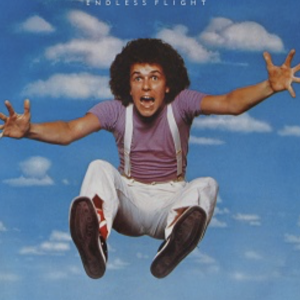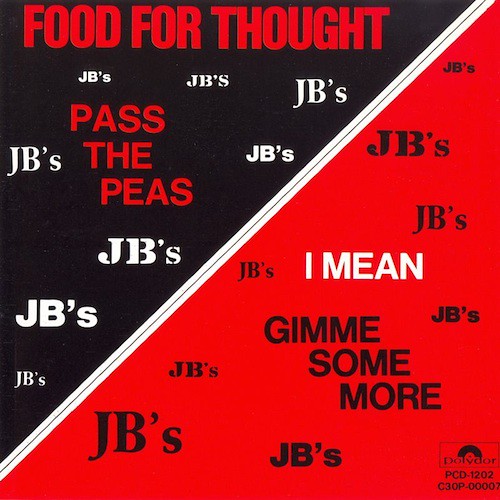Soul Strut 100: # 61 - The J.B.'s - Food For Thought
 RAJ
tenacious local 7,783 Posts
RAJ
tenacious local 7,783 Posts
I will slowly be unveiling the Top 100 Soul Strut Related Records as Voted by the Strutters Themselves.
# 61 - The J.B.'s - Food For Thought

About
Food For Thought was the J.B.???s first official record, and it might be their very best. It starts off with one of their greatest songs, Pass The Peas, with its infectious horn line. That???s followed by an unstoppable parade of funky instrumentals in a similar fashion such as Gimme Some More, the fast-paced To My Brother, Hot Pants Road, These Are The JB???s, the blaring The Grunt, Escap-Ism Part 1 & 2 with James Brown urging the band along and then busting out with an organ solo in the middle, the soulful Wine Spot, and the slow and moody Theme From King Heroin. As usual, there???s also a jazzy tune in the form of Blessed Blackness that starts off the second side.
Related Threads
J.B.???s Food for Thought???purple cover?
THE JB REMEMBERANCE THREAD!
Media

# 61 - The J.B.'s - Food For Thought

About
Food For Thought was the J.B.???s first official record, and it might be their very best. It starts off with one of their greatest songs, Pass The Peas, with its infectious horn line. That???s followed by an unstoppable parade of funky instrumentals in a similar fashion such as Gimme Some More, the fast-paced To My Brother, Hot Pants Road, These Are The JB???s, the blaring The Grunt, Escap-Ism Part 1 & 2 with James Brown urging the band along and then busting out with an organ solo in the middle, the soulful Wine Spot, and the slow and moody Theme From King Heroin. As usual, there???s also a jazzy tune in the form of Blessed Blackness that starts off the second side.
Related Threads
J.B.???s Food for Thought???purple cover?
THE JB REMEMBERANCE THREAD!
Media


Comments
Speed.
They had one rack of cut outs. Maybe 50 lps, perhaps 25 titles.
I also got Lynn Collins Think, Smokey Quite Storm, maybe also a Parliament and a Redd Foxx.
Who knows what I left behind.
Anyway, it got a lot of spins.
The James Brown Biographies delve into how he was able to be in complete control at King where he was dealing directly with the owner.
But at Polydor (until they brought in Shapiro) he was in (nearly) complete control.
He was given his own imprint and a free hand to sign, record and release who ever he wanted. (It would seem.)
How was he able to do that at a time when most artists had little control?
Other Polydor stars, Eric Clapton, John Mayal, Bee Gees, did not appear to have (or want) that kind or control.
What artist in 1971 had this kind of artistic business control?
Beatles, Stones of course. Ray Charles. Others?
In Germany this record was titled "Pass The Peas" and it has a different cover.
It doesn't look much better, though:
:necessary:
Because he sold records and made money hand over fist. I'd even venture to say that JB was probably Polydor's biggest seller between 1971-75, even with John Mayall, Roy Ayers, Mandrill, Joe Simon and Millie Jackson on the label.
In the 70s, Clapton and the Bee Gees were on RSO, which wasn't distributed by Polydor until maybe 1976. By which time JB's popularity was waning.
Curtis Mayfield. Stevie Wonder was just starting to gain control of his recordings.
I hate to say it but I guess James Last outsold JB big time.
it's all about this track for me
"Food for Thought" by The J.B.'s is a great funk LP, all killer no filler! This LP, by far, is my favorite J.B.'s release. I'm hard-pressed to pick a favorite, but I must go with "Pass the Peas" and "The Grunt" in a two-way tie. I'm glad this LP was recognized on the Soul Strut 100.
Peace,
Big Stacks from Kakalak
Interestingly, many songs on this album aren't even the J.B.'s but Fred Wesley solo session efforts (prime examples are "Blessed Blackness, " "King Heroin", "To my brother" and 'Wine Spot". etc.) with very little or zero James Brown input. In fact, they were recorded with session musicians hired by Wesley in NY, among them prominent Jazz artists like the Brecker Brothers. The songs on this album were recorded at a time when Brown wasn't very interested in recording.
The only truly original J.B.'s group session tunes are "Pass the peas", "The Grunt" and "Escape-ism."
What about "These Are The J.Bs"?
I will need to go back and listen again.
That Fred Wesley (or Charles Bobbit, or Dave Mathews) were the leader and organizer of these sessions I can believe.
That studio musicians were used (on some of the songs) I can believe.
That James Brown had very little or zero input just does not make sense to me.
I'll have to find out .. I wasn't quite sure, which is why I didn't mention it. My guess is that it is a true J.B.'s tune, especially since Brown's vocals are on it.
Regardless of whether he had any worthwhile ideas or not.
Which is why I find it hard to believe that:
In 1971 the JBs had hits with Escape-ism and Hot Pants (Which is not on Food For Thought iirc).
James Brown had 5 chart hits that year.
James released 4 lps in 1971.
In 1972 the JBs hit with Gimme Some More and Pass The Peas.
James Brown had 7 chart hits that year.
James released 2 lps in 1972
While most of the lp cuts may have been made at a time, when Brown wasn???t very interested in recording,
I would guess that the "time" in question was a week, or a day, or an afternoon.
Brown had very little input in the instrumental tracks, if any at all. He wasn't even present at the recording sessions. Fred would play the finished songs for him and they usually met his approval. Sometimes, Brown asked for minor changes. But "Blessed Blackness" and "Wine Spot" are good examples for tunes that Brown had zero input in Zero.
A acouple of years after this album was released, Brown signed a contract to score the soundtrack for "Black Caesar."
Brown wasn't interested in recording any new music for this film. Instead, he told Polydor to put together an album of older hits to include in the soundtrack. It took Fred a lot of energy to convince Brown to at least include a few new songs, which turned out to be "Down and out in New York City" and "The Boss." Fred then went behind Brown's back and recorded a bunch of additional tunes that he submitted to the movie producers without Brown's approval. It was at the premiere of Black Caesar that Brown first heard these tunes - and he was about to fire Fred for it. But the soundtrack received so much critical praise that Wesley got away with it.
You're right, I should have worded this a bit more careful ...
Brown wasn't as interested in recording during that time as he used to be.
Evidence for this is the huge creative impact and control that Fred Wesley had on his music during that time. In the 1960s, Brown was the main force behind the composition of his music. He would conceive a song idea, hum out the parts and talented band leaders like Alfred Pee Wee Ellis would translate these ideas into music.
But when the James Brown Band walked off stage and forced Brown to hire Bootsy's guys (The Pacemakers), this changed the dynamics quite a bit. Fred returned shortly after, and assumed his job as musical director. For a while, Brown was inspired by the drive the youngsters brought to his music, but he did not connect with them .. they were from a different school. Consequently, it was Fred who had to work with them, and Bootsy's guys soon split. Fred hired many of the new guys, and he often left Augusta - where Brown had moved back to - to work with musicians of his own choice in New York, where he kept an apartment. He would play his ideas to Brown and Brown would usually suggest some changes ... but I'd say that Brown's music in those years was 20% Brown and 80% Wesley.
Brown definitely suffered from creative burn-out during that time. He wasn't the high in demand artist anymore and he couldn't keep up with the changing dynamics in black music. That's why he kept re-recording and recycling his old hits, hoping to make them sound more fresh.
Bottom line, it's not like Brown wasn't interested in recording at all .. he was just less interested - and possibly burnt out - compared to his creative peak which was between 1965 and 1970. It is for that reason that Fred Wesley had pretty much free hand.
And you know that he'd usually take credit even if he didn't write the song at all. Credits on a James Brown record should never be used to determine who wrote the song. Charles Bobbitt, Brown's manager, never wrote a song in his life, but he's made millions as a "songwriter."
"Think (about it)" was written by Lyn Collins - yet Brown took full credit. Lyn fought him until her death. And that's just one example ..
Considering that this was a JBs album and not a James Brown album, this was a good thing.
JB was usually a little too hands-on with the people he produced. He could be plainly heard hollering in the background on Lyn Collins' records. When the JBs were chanting in unison, James' voice was louder than everybody else's. Even Hank Ballard's "From The Love Side" starts out with James Brown playing emcee. So if he had zero input on the JB's debut album, then right on for Fred Wesley!
You're right, he liked to holler and scream the loudest .. Many artists were quite annoyed with this, because these contributions usually ruined the songs as they perceived them ... Lyn Collins was pissed about how Brown killed "Rock me again & again etc" with his silly chanting of "ahh-yayayayayayayaya" in the background ...
What I was talking about was true creative input. And for the record, I didn't say that he had zero input on the first JB's album, but on the songs that I mentioned, which were, by the way, also slotted to be released on Fred's 1975 solo album "Watermelon man" on People Records. Most songs on this album are straigh ahead Jazz, but it also included some JB's b-sides ("Use me", "Backstabbers") and the Herbie-Hancock cover "Watermelon Man", on which Brown plays drums.
I think that was later.
He had 17 top ten R&B hits, seven of which reached number one between 71 and 74, which is one hell of a record for someone who couldn't keep up.
He remained one of the most in-demand artists throughout that period. 75 onwards, less so.
My favourite part.